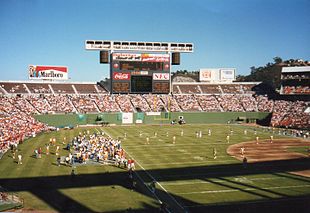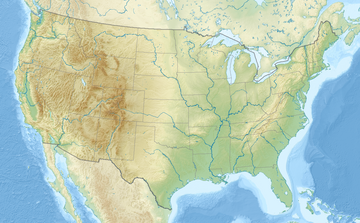|
1987 NFL season
 The 1987 NFL season was the 68th regular season of the National Football League (NFL). This season featured games predominantly played by replacement players, as the National Football League Players Association (NFLPA) players were on strike from weeks four to six with week three being cancelled in its entirety. This remains the last NFL season in which regular-season games were impacted by a labor conflict (as well as the last season when non-union players were used as strike-breaking competitors). The season ended with Super Bowl XXII, with the Washington Redskins defeating the Denver Broncos, 42–10, at Jack Murphy Stadium in San Diego. The Broncos suffered their second consecutive Super Bowl defeat. Player movementTransactionsTrades
DraftThe 1987 NFL Draft was held from April 28 to 29, 1987, at New York City's Marriott Marquis. With the first pick, the Tampa Bay Buccaneers selected quarterback Vinny Testaverde from the University of Miami. Referee changesChuck Heberling retired during the 1987 off-season. He joined the NFL in 1965 as a line judge before being promoted to referee in 1972. Games that he officiated include the Hail Mary Game and The Drive. Fred Silva, who was a swing official in 1986, was given his own crew again. Major rule changes
The NFLPA strikeA 24-day players' strike was called after week 2. The games that were scheduled for the third week of the season were cancelled, reducing the 16-game season to 15, but the games for Weeks 4, 5 and 6 were played with replacement players. The NFLPA actually ended the strike before the week 6 slate of games, but the NFL owners' unanimously nixed their return that week because the union had missed an owner-mandated deadline that week to be eligible to return, and would have to wait until week 7 to resume playing. Approximately 15% of the NFLPA's players chose to cross picket lines to play during the strike; prominent players who did so included New York Jets defensive end Mark Gastineau, Dallas Cowboys defensive tackle Randy White, San Francisco 49ers quarterback Joe Montana, Los Angeles Raiders defensive end Howie Long, 49ers running back Roger Craig, New England Patriots quarterback Doug Flutie and Seattle Seahawks wide receiver Steve Largent.[2] The replacement players were mostly those left out of work by the recent folding of the Canadian Football League's Montreal Alouettes and the 1986 dissolution of the United States Football League, as well as others who had been preseason cuts, had long left professional football or were other assorted oddities. The replacement players, called to play on short notice and having little chance to gel as teammates, were widely treated with scorn by the press and general public, including name-calling, public shaming and accusations of being scabs. The games played by these replacement players were regarded with even less legitimacy – attendance plummeted to under 10,000 fans at many of the games in smaller markets and cities with strong union presence, including a low of 4,074 for the lone replacement game played in Philadelphia) — but nonetheless were counted as regular NFL games.[3] Final television revenues were down by about 20%, a smaller drop than the networks had expected.[4] The defending Super Bowl champion New York Giants went 0–3 in replacement games, ultimately costing them a chance to make the playoffs and to repeat their championship. The final replacement game was a Monday Night Football matchup on October 19, 1987, with the Washington Redskins at the Dallas Cowboys. Along with the Philadelphia Eagles, the Redskins were the only other NFL team not to have any players cross the picket line and were surprising 13–7 victors over the Cowboys who had plenty of big name players cross the picket line. The 2017 film Year of the Scab, which aired as part of the ESPN series 30 for 30, documented the story of the replacement players who crossed the picket line to play for the Redskins.[5][6] A fictionalized account based on the 1987 strike formed the basis of the 2000 film The Replacements. American BowlA series of National Football League pre-season exhibition games that were held at sites outside the United States, the only American Bowl game in 1987 was held at London's Wembley Stadium.
Regular seasonScheduling formula
Highlights of the 1987 season included:
Final standings
Tiebreakers
Playoffs
Awards
Coaching changes
Stadium changesThe Miami Dolphins began playing at their new home, Joe Robbie Stadium, moving from the Miami Orange Bowl. This was also the Cardinals' final season at Busch Memorial Stadium in St. Louis; the team relocated to Tempe, Arizona, the following season. Uniform changes
Television changesThe eight-year old ESPN cable network signed a three-year deal to become the first cable television broadcaster of the league, broadcasting a series of Sunday night games during the second half of the season.[7] Its program ESPN Sunday Night NFL (subsequently rebranded as ESPN Sunday Night Football) debuted on November 8, 1987. The league also mandated that each ESPN game must air via broadcast syndication to an over-the-air station in the markets of the participating teams. ESPN also debuted NFL Primetime, featuring scores, highlights, and analysis of the Sunday afternoon games; the program served as a pregame show during those weeks of Sunday Night Football. In addition, ABC, CBS, and NBC each signed three-year contracts to renew their rights to broadcast Monday Night Football, the NFC package, and the AFC package, respectively.[7] ABC returned to a three-man booth, hiring Dan Dierdorf from CBS to join Al Michaels and Frank Gifford. ESPN's initial broadcast team consisted of Mike Patrick on play-by-play, with Roy Firestone and a weekly "guest color commentator". NFL Primetime included host Chris Berman, and analysts Tom Jackson and Pete Axthelm. NBC renamed its pregame show NFL Live! Gayle Sierens then made history as the first woman to do play-by-play for an NFL regular season game, calling NBC's telecast of the December 27 game between the Seattle Seahawks and the Kansas City Chiefs. CBS fired "Jimmy the Greek" Snyder on January 16, 1988, a few days before the NFC Championship Game, after he made several questionable comments about African Americans during an interview with Ed Hotaling, producer-reporter for Washington, D.C. NBC-owned station WRC-TV.[8] References
Footnotes
|
||||||||||||||||||||||||||||||||||||||||||||||||||||||||||||||||||||||||||||||||||||||||||||||||||||||||||||||||||||||||||||||||||||||||||||||||||||||||||||||||||||||||||||||||||||||||||||||||||||||||||||||||||||||||||||||||||||||||||||||||||||||||||||||||||||||||||||||||||||||||||||||||||||||||||||||||||||||||||||||||||||||||||||||||||||||||||||||||||||||||||||||||||||||||||||||||||||||||||||||||||||||||||||||||||||||||||||||||||||||||||||||||||||||||||||||||||||||||||||||||||||||||||||||||||||||||||||||||||||||||||||||||||||||||||||||||||||||||||||||||||||||||||||||||||||||||||||||||||||||||||||||||||||||||||||||||||||||||||||||||||||||||||||||||||||||
